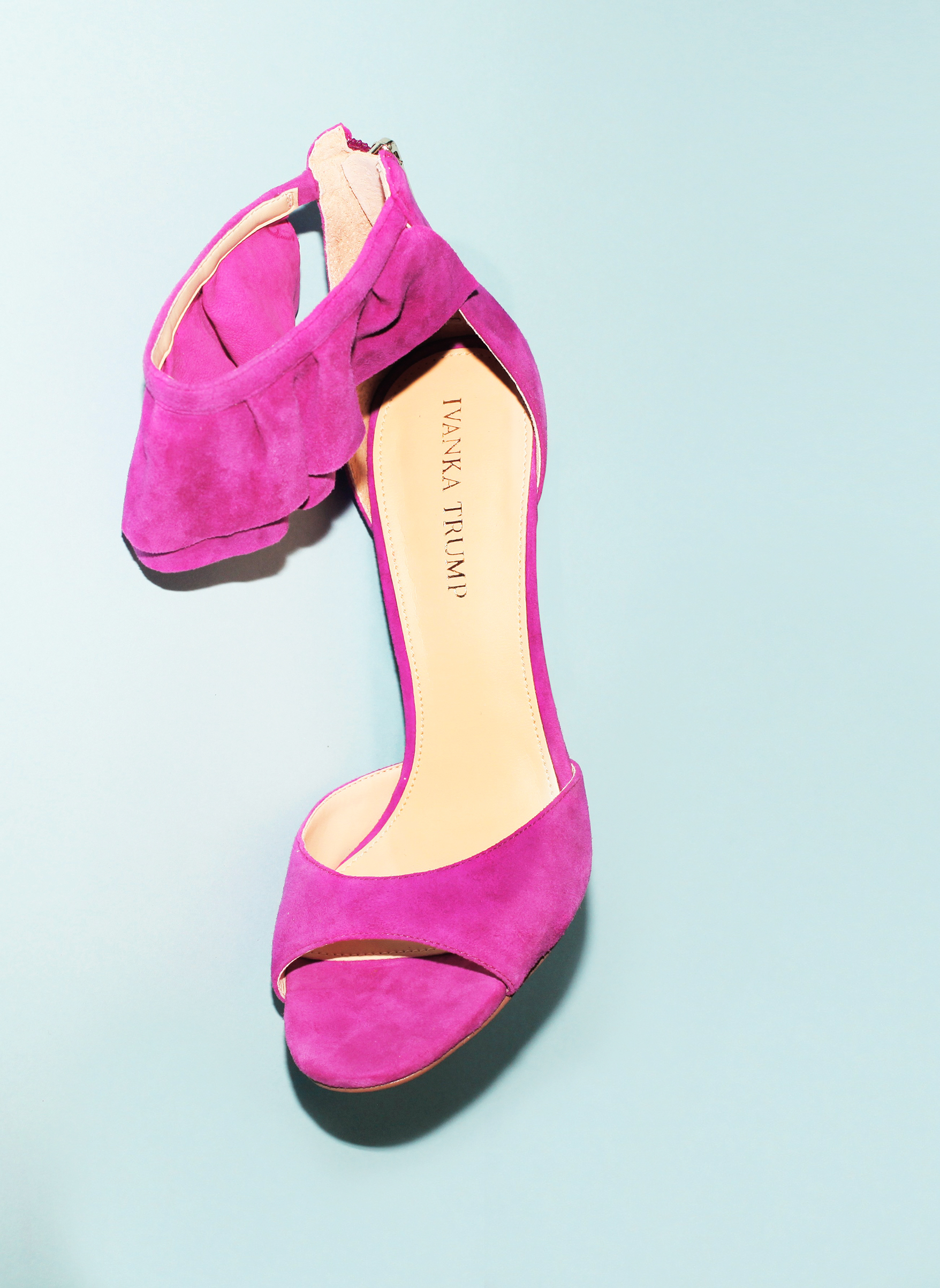Beijing’s Parkview Green shopping mall is a towering wedge of steel and glass where China’s young and ravishing gather to browse and be seen. Scores of international brands like Moschino, Stella McCartney and even Brompton foldable bikes–the hipster’s favorite–fan out from an airy central atrium. Mellow hip-hop beats envelop lounging fashionistas who nurse Starbucks iced coffees while catching up with the latest live-streaming shows on iPads covered in stickers.
One brand is conspicuously missing from this carnival of chic. “I really hope Ivanka Trump opens a shop in this mall,” says Chen Shanshan, 32, wearing a black romper and gold-rimmed sunglasses as her young daughter swings on her arm demanding ice cream. “I think Ivanka is a nice woman and very successful in her career. I’d check it out.”
Trump used to have an eponymous fine-jewelry store in Unit 23 on Parkview’s LG1 floor, but that 78 sq m of prime retail space was taken over by a rival jeweler from Monaco two years ago. Trump’s store launched in 2013 as the first of five slated for the “greater China” market, which also includes Hong Kong and Taiwan. At the time, Trump told the Wall Street Journal that the openings were one of her “primary focuses going forward.” A press release estimated that each new store would bring in minimum annual revenue of $3 million.
None of the other shops materialized, and the Parkview branch closed in 2015, a casualty of China’s cutthroat luxury-goods market. Yet today Trump’s brand is booming across the Middle Kingdom, whose swelling middle class hankers for the latest threads from New York, Paris and London. “As the daughter of the U.S. President, Ivanka Trump has an initial advantage of publicity,” says Yang Mei, 29, a designer for Beijing-based fashion studio Azrael YM.
Trump’s firm does not publish sales figures, but its fortunes trace her father’s political rise. Company president Abigail Klem told TIME there was “significant year-over-year revenue growth” in an emailed statement. Annual revenue estimates of about $100 million were increased by $17.9 million for the year ending on Jan. 31, according to New York City–based G-III Apparel Group Ltd., which has the exclusive license to make Trump clothing. According to leading fashion web portal Lyst, global orders for Ivanka Trump products in February, a month after Donald Trump’s Inauguration, were up 774%, compared with the same month the year before. In China, where Lyst has yet to open a dedicated site or offer a Chinese-language option, there was a doubling of orders and a 284% increase in searches for Ivanka Trump.

Chinese consumers typically order her brand via Taobao, the online marketplace owned by Jack Ma’s Alibaba Group, which sells everything from incense sticks to pet miniature pigs. Alibaba does not provide sale or search figures, though a quick comb through the site shows no shortage of Trump merchandise. “On average, we can sell 20 pairs of Ivanka Trump shoes a month,” says a sales rep for just one Taobao clothing store, Miss_SS. “Before [Donald] Trump became U.S. President, we didn’t sell Ivanka’s brand, but then people started asking for it.”
Ivanka Trump’s burgeoning profile in China spotlights how difficult it is to untangle her family’s dizzying commercial interests from a White House that is itself run like a family firm. Trump, 35, and her husband, real estate scion Jared Kushner, 36, both hold official advisory positions in her father’s Administration, underscoring the ethical tightrope the President’s daughter must walk to maintain a business empire that reaches across the globe–one that grows ever stronger alongside her expanding political role.
In China, where Trump produces the bulk of her branded wares, she is not only ramping up sales but also, alongside Kushner, playing a key role as an interlocutor with Beijing. Donald Trump frequently railed against China at the stump, accusing its export-driven economy of stealing American jobs and vowing to impose 45% tariffs on imports and label it a currency manipulator. But the U.S. President has since tempered his rhetoric and even praised Chinese President Xi Jinping for working to rein in North Korean leader Kim Jong Un–though he has since tweeted that those efforts have “not worked out.”
Ivanka Trump and her husband are credited by China experts on both sides of the Pacific with engineering her father’s thaw with Beijing. She has also played a role in increasing pressure on China’s human-rights record, speaking at a June 27 event where Secretary of State Rex Tillerson announced that China had failed to take “serious steps to end its own complicity” in human trafficking.
Donald Trump initially angered Xi by questioning Chinese sovereignty over independently governed Taiwan, which Beijing deems part of its “core interests.” It was only after the First Daughter helped clear the air with Cui Tiankai, the Chinese ambassador to the U.S., that the two leaders finally shared a phone call. Cui had invited the Kushners to a Chinese New Year embassy reception, where their Mandarin-speaking daughter Arabella, who is just shy of 6, charmed the crowd.
The intervention was imperative given that the U.S. President had broken protocol by not issuing a Chinese New Year’s greeting on the first day of the auspicious holiday. Kushner then took the lead organizing a summit between the leaders of the world’s two biggest economies at the U.S. President’s Mar-a-Lago resort in April. “Ivanka Trump and Jared Kushner are very important to U.S.-China relations,” says Zhan Jiang of Beijing Foreign Studies University. “It’s a Chinese mentality to value these family connections.”
Family is a powerful diplomatic tool that Trump and Kushner wield in China, often in the shape of Arabella, who learned Mandarin from the crib thanks to a Chinese nanny. With her 3-year-old brother Joseph, she sung in Mandarin at Mar-a-Lago, yet she was already a social media star in China for her devastatingly cute renditions of traditional Chinese songs. The presidential performance has been viewed more than 2.2 million times on China’s leading Internet TV site, qq.com. “Chinese people like to worship idols, and Ivanka really triggered a fever in China,” says Hu Xingdou, a professor of economics at the Beijing Institute of Technology. “Plus, she is very friendly to Chinese people, so she has a lot of fans here.”
Social media fan clubs hail her as “a goddess,” while state media have described her as having an “elegant and poised style.” (Chinese leaders may figure that, through Trump, they can more easily engage with her father.) She is particularly feted for her have-it-all feminism. In a land where everyone is seemingly an aspiring entrepreneur and self-help books crowd shelves, Trump’s speeches are scrutinized for pointers on climbing the corporate ladder and staving off chauvinism in the office and at home. Many Chinese also see Confucian values in her decision to convert to Judaism for her husband and in her filial defense of her father, despite his latent misogyny. “Ivanka is the perfect woman,” says Zhang Hang, 32, who works for an IT company in Beijing. “Ivanka knows how to balance career and family–that’s what I should learn from her.”

But Trump’s business ties threaten to undermine the shrewdness of her diplomacy. On the same day that Xi and her father dined at Mar-a-Lago, Ivanka Trump’s brand had three new trademarks approved in China for jewelry, leather handbags and spas. Those were in addition to 15 existing trademarks for cosmetics, luggage, clothes, shoes, retail and beauty services. More than 40 applications are still pending. There is no sign that that decision was rushed as a favor, and the Ivanka Trump brand insists that the trademarks are simply defensive to ward off counterfeiters, especially as “trademark squatting” is rampant in China. Owing to her newfound celebrity, hundreds of trademark applications under Trump’s Chinese name–Yi Wan Ka–have been filed on myriad products and services. On June 14 the Chinese government granted preliminary approval for nine Donald Trump trademarks it had previously rejected. His lawyer said they, too, were defensive to stop unsanctioned businesses from using his name.
The White House has argued that there is no improper conflict of interest. “Jared and Ivanka will fully abide by government ethics rules and will recuse when appropriate in consultation with the Office of White House Counsel,” said one White House official. Klem, the president of Ivanka Trump’s brand, told Congress in May that Trump has limited control of her business and must consult with an ethics adviser “prior to certain actions,” which were not specified.
Trump’s business model mirrors that of virtually all her competitors in the apparel industry: use low foreign wages and minimal import levies to maximize profits. That’s precisely what her father railed against during his volcanic campaign, when he pledged to put “America first” and force U.S. companies to bring manufacturing jobs back home. Some of the 80 workers employed at one Chinese factory making blouses, dresses and other items under Trump’s label were paid just over $60 for a 60-hour workweek, according to an outside audit published by the Fair Labor Association in April.
An investigation by New York City–based NGO China Labor Watch found dubious labor practices at factories producing Ivanka Trump shoes, including excessive overtime, low pay and the possible misuse of student interns. The case made global headlines in late May, when three CLW investigators were arrested by the authorities, only to be released on June 28 on bail after being detained for 30 days. The Ivanka Trump brand distanced itself from the factory in question, saying the shoes had not been made there since March.
Yet Trump and Kushner look likely to get more, not less, involved with China. On June 18 they hosted former Iowa governor Terry Branstad, the new U.S. ambassador to China, who has known Xi since the 1980s, at the Trump Hotel in Washington. Two days later, U.S. and other media reported that the Chinese government had extended a special invitation to Trump and Kushner to travel to Beijing in preparation for a presidential visit.
Correction: The original version of this story incorrectly described G-III Apparel Group Ltd. The company manufactures apparel under the Ivanka Trump license, but it does not make Ivanka Trump shoes and was not involved with the brand’s trademark applications.
More Must-Reads from TIME
- Caitlin Clark Is TIME's 2024 Athlete of the Year
- Where Trump 2.0 Will Differ From 1.0
- Is Intermittent Fasting Good or Bad for You?
- The 100 Must-Read Books of 2024
- Column: If Optimism Feels Ridiculous Now, Try Hope
- The Future of Climate Action Is Trade Policy
- FX’s Say Nothing Is the Must-Watch Political Thriller of 2024
- Merle Bombardieri Is Helping People Make the Baby Decision
Write to Charlie Campbell / Beijing at charlie.campbell@time.com